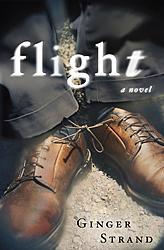
by Zinta Aistars
# Hardcover: 320 pages
# Publisher: Simon & Schuster, 2005
# Price: $24.00
# ISBN: 0743266846
(Published in the Fall 2005 issue of LuxEsto, the Kalamazoo College alumni magazine.)
"You have to be able to kill your babies," says Ginger Strand. But the look in this author's eyes is anything but murderous. Ginger Strand's baby, debut novel Flight, published by Simon and Schuster and released May 2005, has taken its first steps into the literary world, and Ginger is one proud mama.
Flight is a story about family. Real family. The kind with dysfunctions in every closet. Set in a fictional rural Michigan town, the Gruen family gathers on the family farm to celebrate the wedding of youngest daughter, Leanne.
Will Gruen, the father, is a pilot who is feeling his age and the fast approach of what may be his last opportunity as a commercial airline pilot. He has received an offer that would mean relocating to Hong Kong, and he has yet to gather the courage to broach the subject with wife, Carol. He wonders if he might accept the transfer even if Carol does not agree to go with him.
And she might not. On Carol's mind is a bed and breakfast, and as she moves about the farmhouse in wedding preparations, her mind is filled with ideas of transformation for the farmhouse into a business, and with it, the giddy seduction of independence.
Eldest daughter Margaret has secrets of her own. She arrives making excuses for an absentee husband, but over the span of the three days of wedding preparation, it is revealed that divorce, complete with messy custody battles, is impending.
But surely the bride is happy? No. The bride is sneaking drinks from a silver flask, and not only does she suffer cold feet the night before the wedding—she takes flight.
Ginger Strand's first novel takes on family drama with openhearted courage. The reader is allowed to feel a part of the wedding hustle and madness, and to be one of the family, without fanfare, roll up your sleeves and help shell the shrimp.
Strand's literary style is straightforward with just the right spice of wit. She tells an everyday story with flair and humor. A subtle parallel image throughout the drama is a pair of caged doves being kept for dramatic release at the wedding ceremony. Throughout the movement of the story, now and then, here and there, the characters check the doves: are they perhaps feeling ill from being caged too long and kept in the garage? Will they take flight on cue?

Ginger Strand
I met Ginger Strand during her reading at Athena Book Shop in Kalamazoo (she returned home to unveil her Flight, but currently resides in New York City). A short time later, I attended a book fair in Ann Arbor, Michigan, where Strand discussed her book, the process of becoming a published author, and how Kalamazoo College prepared her to take wing.
LuxEsto: Give us a background snapshot of who you are, your roots, your life today, and what it is that drives you.
Ginger: I grew up in a lot of places, but spent most of my high school years in Allegan, a small town about 30 miles north of Kalamazoo. Kalamazoo College was the only college I applied to, because once I visited I knew it was the right place for me. After Kalamazoo, on the advice of some of my professors, I went on to Princeton for a Ph.D. in English. However, it became apparent to me that I didn't want to be a scholar of literature; I wanted to write. So I finished the degree, but left academia and took a job as a copywriter for a branding and marketing firm. I signed up for night classes in fiction at the Writers' Voice in New York. Now I do freelance copywriting--you have to make money, after all!--teach writing occasionally, and devote most of my time to my own work.
LuxEsto: And your connection to Kalamazoo College? What was your experience at Kalamazoo?
Ginger: I majored in English at Kalamazoo College, doing a ten-week foreign study in Hanover, Germany, so that I could spend two quarters on the Great Lakes Colleges Association (GLCA) New York Arts Program in my junior year. That program was fantastic. I worked as an intern at The Paris Review, which gave me some real insight into the literary world and how it worked. (Incredibly, I decided to brave it anyway!) It also made me realize New York was where I wanted to live. The city energizes me.
My student individual project in the English department was a comparison of Chaucer's and Shakespeare's version of the Troilus and Cressida story. I loved immersing myself in Middle English for a semester. Howard Roercke was my advisor—a man as courtly and erudite and refined as a medieval lyric himself. He died the year I graduated, and was much missed.
LuxEsto: How did your Kalamazoo College education lead you to where you are today? Did your experience here help you as a writer?
Ginger: Kalamazoo was a great place to be in love with books. Writers always visited, and we went to their readings, because at Kalamazoo College the world of books was important. My classes taught me to be a better reader, as well as shaping me as a writer. I took poetry with Conrad Hilberry, a great inspiration, and writer-in-residence Colette Inez. Both are still friends. I also took a fiction class with Erin McGraw. All my seminars taught me how to commit to writing, and helped me start building a voice. In addition, there were inspiring people and writers like Gail Griffin who showed me how writing and life could help shape each other.
Most importantly, Kalamazoo College taught me a level of independence I think is critical to writing and to other pursuits too. Often I hear news of classmates who are doing self-motivated, creative, inspiration-driven things, whether it's writing, or bell ringing or starting an independent press. All of these things require you to dive into a project, follow an obsession with both seriousness and wonder, and put it all together in a coherent way at the end. Some people might be born with that ability, but I learned it at Kalamazoo College, through things like my SIP, doing an independent study, even just class projects. Kalamazoo College always held me to high standards, not just of execution, but of self-direction. That served me well in grad school, and it's served me well as a writer.
LuxEsto: Tell us something about Flight when it was still grounded. What was the creative seed to this story? The story behind the story?
Ginger: Flight centers on a commercial pilot trying to hold himself and his family together in the aftermath of 9/11 and the lead-up to his retirement. My father was a commercial pilot while I was growing up, and at some point I began to think of his career--from the heyday of the sixties through the era of deregulation and airline bankruptcies--as representative of an era of sweeping change in American life. The story, however, is made up and the characters are fictional, though I did borrow a number of my father's tales. My dad never went to Vietnam, as my character Will does, so I had to do a fair bit of research for that section.
LuxEsto: Perhaps there are budding writers and creative artists among our readership, and those of us in the creative arts know pursuing a career in that direction can be harsh on even the thickest hide. Can you tell us something about your own path to publication? How did you fit writing into your schedule?
Ginger: I probably shouldn't admit this, but my first published story was written entirely on company time! I used to write a lot on the subway, too, on my way to and from work. My earliest published stories were really short, because I wrote at night, on weekends, on business trips--whenever I could squeeze it in. You have to love doing it enough to want to do it in your free time.
I started to take myself seriously as a writer when I took two weeks off my copywriting job to take a seminar with Michael Cunningham at the Fine Arts Work Center in Provincetown. He encouraged me to start sending things out. I then spent a couple of years writing and publishing short stories and essays in obscure but meritorious literary journals. Finally, I had what I thought was a collection, and sent it to an agent recommended by a journal editor. The agent took me on--but asked me to rewrite the book as a novel. Boy was it hard to hear that! But he was right. I did it and he sold it.
Telling the story like that, it sounds pretty straightforward. But of course, it's not. It's a long, hard slog full of doubt and rejection. If I didn't love the actual process of writing--if I didn't give a sigh of pleasure every time I sit down at my keyboard--I wouldn't do it. I'd go get a well-paying job that was easier, and offered perks like free office supplies, a 401-K, and respectability.
LuxEsto: Ever get (God forbid and knock on wood) writer's block?
Ginger: Don't even speak of it! No, what I get is "writer's schlock." You have to be willing to write what I call schlock before you get to the good stuff. To stop writing is death. I learned this at Kalamazoo College, too: Con Hilberry taught us that 90 percent of what we write is practice for the other ten percent. I find that to be true for my work, too. You have to be willing to kill your babies. A writer gets deeply attached to her work, but you must be able to let go of what does not fall into that ten percent.
One of the most valuable lessons I learned at Kalamazoo as a young writer was not to fear failure. We were taught to try, fail, try again, fail better. We weren't coddled in our creative writing classes at Kalamazoo. I learned not to be crushed by a "bad" critique, but that the occasional production of bad writing is part of the process. Writing is about process. In our classes, it was never about the best grade, but about learning.
LuxEsto: Other published works?
Ginger: In addition to fiction, I write essays on topics that obsess me. Last year it was public aquariums: I published a long essay on them in the February issue of The Believer, very cool magazine put out by the people who publish McSweeney's. It has been reprinted since in Harper’s magazine. Currently I have an essay in Swink (www.swinkmag.com) called "Against Connoisseurship." My website, www.gingerstrand.com , has links to these and other things.
LuxEsto: What are you working on now? Goals?
Ginger: I have a number of essays and short stories in the cooker, as well as a new novel I started last summer. They are all competing for my attention right now, but I can feel that one of them is going to rise to the top and begin to obsess me very soon. That's a great feeling when it happens. Although it means you run out of underwear because you don't do laundry for months.
~~~~~~~~~~~~~~~~~~~~~~~~~~~~~~~~~~~~~~~~~~~~~~
For more information about Ginger Strand and her work, see
www.gingerstrand.com
~~~~~~~~~~~~~~~~~~~~~~~~~~~~~~~~~~~~~~~~~~~~~~

